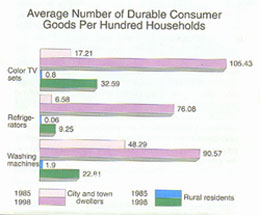|
Consumption
At the end of the 1980s, the rationing
system basically came to an end all over the country. Now the consumer
goods market has plenty of everyday articles, as well as food; and
fundamental changes have taken place in consumption patterns, transiting
from simply having enough to eat and wear to the better-off pattern.
The Engel coefficient (the proportion of food expenses in the total
consumption expenditure) of urban residents dropped from 57.5 percent
in 1978 to 41.86 percent; that of rural residents, from 67.7 percent
to 52.56 percent. Meanwhile, the proportion of recreational, educational,
cultural and service expenses of urban residents increased from
6.7 percent to 12.3 percent; that of rural residents, from less
than one percent to 10.7 percent.
With adequate food and
clothing, the consumption patterns of urban and rural residents have
been optimized step by step; and the quality of life has been remarkably
improved, changing from quantity satisfaction to quality improvement.
The consumption of meat, eggs, poultry, milk, aquatic products, vegetables
and fruit has kept increasing, and that of staple food such as grains
has decreased by a big margin. According to statistics, the dietetic
nutrition level of Chinese residents has basically reached the level
of the Asian countries with medium-level incomes. Clothing standards
have changed, too. People wore dull-colored, cheap clothes in the
past. Now more and more consumers show interest in more fashionable
and more expensive clothes, aiming at displaying their own personalities.
Urban residents pay attention to new-style, beautiful, comfortable
and well-made clothes. The consumption proportion of ready-made clothes
has increased greatly, and the average consumption volume of cloth
is equivalent to the world??s average. Durable consumer goods for urban
and rural residents have increased in number and improved in quality,
with the popularization rate increasing rapidly. After having experienced
the transition from the ??four old commodities?? (bicycles, wrist watches,
sewing machines and radios) to the ??six new goods?? (TV sets, washing
machines, tape recorders, refrigerators, electric fans and cameras),
urban residents are now paying attention to new consumer goods, including
telephones, household computers, cars and commercial housing. According
to statistics, the number of TV sets per 100 households in China is
higher than the world??s average.
|
A
corner of a chain store.
??

Welcoming
a bride--a local
custom in Northern China.
??
?? 
|



